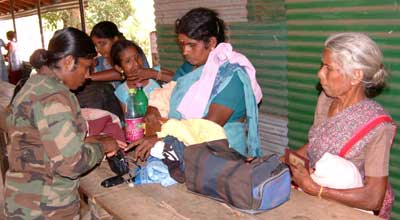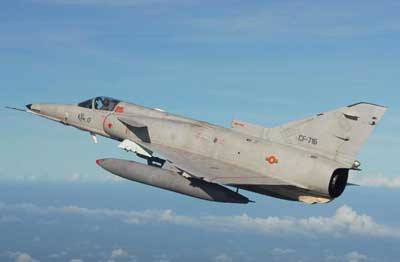
Seasonal lull prelude to New Year battles
With the New Year only eight days away, the customary lull has returned to the battlefields of the North and East. In terms of both the military and the Tiger guerrilla calendar, the more than two decades of war has not seen any major encounters during the Christmas and New Year season. Yet, the defence establishment in Colombo does not want to take any chances. The state of high alert and troop/police deployment, particularly in the City of Colombo and the suburbs, will thus continue. The rationale behind this measure is underscored by the response last week of state intelligence agencies to queries by higher ups in the security establishment. For more than one reason I cannot be specific about the questions asked and the detailed answers given. Suffice to say it was whether Tiger guerrillas would launch attacks during this season. The response was a cautious one. Whilst they have not staged any major attacks during this period in the past years, they warned that there is every possibility the guerrillas could seize the opportunity to strike. That is if there are easy targets, be it ones that are economic or VIPs including the military. More so with fears that new groups of guerrilla cadres had infiltrated the City of Colombo and suburbs. That is notwithstanding two important incidents on November 28. One is the attempt on the life of Douglas Devananda, cabinet minister and leader of the Eelam People's Democratic Party (EPDP) killing two and injuring one. The other is the Nugegoda bomb explosion that killed 20 and injured 43. The incidents showed that the guerrillas retained a capability to deploy suicide cadres to carry out attacks.
To any Sri Lankan, the message during the season, therefore, is quite clear. They have to maintain a higher level of vigilance than before. This is compared to the same period last year where the need for such greater vigilance was not badly felt. Bolstering that situation was the confidence that the guerrillas were on the run, particularly from the Greater Colombo area. This was in the wake of stepped up security measures, including cordon and search operations, which led to mass arrests. The fact that tougher, enhanced security measures than those enforced last year were necessary clearly highlights the vagaries of a separatist guerrilla war. That leaves another message for Sri Lankans - gird themselves to the prospects of a heightened undeclared Eelam War IV during the New Year. The fact that there is no major military activity in the battlefields did not mean that the separatist war was not in focus this week. There were several important developments related to it. The United States, the world's only superpower, will bar sales of military equipment to Sri Lanka. It has come in the form of provisions of the Appropriation Act for 2008 for the Department of State dealing with Foreign Operations and Related Programmes. It was the direct result of amendments moved by Senator Patrick. J. Leahy (Democrat) who is Chairman of the Senate Judiciary Committee. The relevant provision (Sec. 699 G) of the Appropriation Act states: "(a) None of the funds appropriated by this Act under the heading "Foreign Military Financing Program" may be made available for assistance for Sri Lanka, no defense export licence may be issued, and no military equipment or technology shall be sold or transferred to Sri Lanka pursuant to the authorities contained in this Act or any other Act, unless the Secretary of State certifies to the Committee on Appropriations that - (1) the Sri Lankan military is suspending and the Sri Lankan Government is bringing to justice members of the military who have been credibly alleged to have committed gross violations of human rights or international humanitarian law, including complicity in the recruitment of child soldiers; (2) the Sri Lanka Government is providing access to humanitarian organisations and journalists throughout the country consistent with international humanitarian law; and (2) the Sri Lankan Government has agreed to the establishment of a field presence of the Office of the United Nations High Commissioner for Human Rights in Sri Lanka with sufficient staff and mandate to conduct full and unfettered monitoring throughout the country and to publicize its findings. (b) Sub section (a) shall not apply to technology or equipment made available for the limited purposes of maritime and air surveillance and communications." The US move, no doubt, is a major blow to Sri Lanka. It was only two months ago that a powerful coastal radar facility was established inside the Dockyard in Trincomalee, home for the Eastern Naval Area Headquarters. This was an outright gift from the United States and was commissioned by the US Ambassador in Sri Lanka, Robert Blake. Thus, moves to either enhance or improve this facility or other matters related to it will not be affected. So will be plans, if any, to install similar facilities elsewhere. However, serving equipment or obtaining ammunition for some of the military equipment including guns procured from the US will become a problem. Questions also arise over procurements of military items with US technology, for example from Israel. Before the sale of Kfir fighter jets, Israel had to obtain prior approval from the US. Similarly, the purchase of two Hercules C-130 transport aircraft from the UK led to British authorities obtaining prior clearance from Washington. The Kfirs are equipped with US-built engines whilst the Hercules C-130s are manufactured in the US. Earlier US Government funded Millennium Challenge Corporation placed on hold funding to Sri Lanka amounting to nearly $590 million. The Corporation said in an official statement that "in the light of the ongoing security concerns in Sri Lanka, MCC will consider a resumption of compact due diligence activities when there is greater prospect for success of our mission." In the early years, military co-operation to Sri Lanka from the United States was confined to only placements for military officers under the International Military Exchange and Training (IMET) programme. However, the scope and content widened when Ranil Wickremesinghe was Prime Minister in the then United National Front (UNF) Government. During his tenure, a top level team from the US Pacific Command arrived in Sri Lanka to make a detailed study of the armed forces. They later submitted a voluminous report, which saw the doors open for US sale of military hardware including some with offensive capability to Sri Lanka. Although reports earlier said that UK had also banned the sale of military hardware to Sri Lanka, official quarters in London declared that such sales were considered on a case-by-case basis. Both the US and the UK, however, have not been the traditional sources of major military supplies to Sri Lanka. The major source has always remained China. Pakistan, which has also remained a supplier, has already announced that it would further enhance a credit line for the sale of military items to Sri Lanka. In addition, a number of Eastern European countries have also been selling such items. This week, a military delegation from Russia was in Sri Lanka. Russia is keen to help Sri Lanka by exporting a variety of military hardware through its state-owned trading arm, Rosboronoexport. For obvious reasons the items sought or on offer cannot be discussed. Also in Colombo this week was a high level seven member defence delegation from India. It was headed by two Joint Secretaries - Bimal Julka (Ministry of Defence responsible for matters relating to Air activity) and T. S. Trimurti who is in charge of the Bangladesh, Sri Lanka and Maldives desk in the Ministry of External Affairs. Others included senior Indian Air Force, Army, Navy and Coast Guard officers. According to diplomatic sources in Colombo, the meeting was a routine review of ongoing bi-lateral defence co-operation with special focus on air threats. The latter was in the light of the LTTE acquiring air capability and some of the threats that emanate from it. Military officials have given the visiting Indian delegation a detailed briefing on the LTTE's air assets and the attacks they have carried out on various targets. The delegation had talks with Defence Secretary Gotabhaya Rajapaksa and thereafter separately with the three armed forces commanders. The Government, it is no secret, will step up military offensives to crack down on Tiger guerrillas. Presidential Secretary Lalith Weeratunga, who was chief guest at the latest passing out parade at the Military Academy in Diyatalawa, said the aim was to reduce the military strength of Tiger guerrillas. Ultimately, he said, there would have to be a political solution to the ethnic problem. He was speaking during the presentation on Friday night, a prelude to the passing out parade yesterday. At this parade 131 officer cadets passed out. They were 62, 62 B and 63 intakes of regular officer cadets. Others were lady intake 6, 8 and volunteer officer cadets intake 44. This year, in the North, the major thrusts of the armed forces have been from their defended localities south of Muhamalai - the gateway to the Jaffna peninsula from the Wanni. In addition, troops also made several forays from the western flank of the defended localities at Omanthai, the entry-exit point to the Wanni. Guerrillas have offered stiff resistance but the troops are continuing their efforts tirelessly. In the East, however, driving the guerrillas from substantial terrain they were dominating was the singular achievement for the armed forces. This also led to their seizing considerable quantities of guerrilla weaponry including even 152 mm artillery guns. Military sources say fears of major thrusts into the Wanni have caused concerns for sections of the civilian population there. They say the guerrillas were preventing them from leaving the Wanni and entering Government controlled areas. Yet, a few families have succeeded in entering the Jaffna peninsula via Pooneryn. Similarly, some families had also arrived through the Mannar side. The allocation of increased funds in the budget has bolstered the mood of the armed forces and the police. Even if the ongoing North-East monsoon is a damper in the coming days, weeks into 2008 will become a challenge to the LTTE's military machine. For both Sri Lankans and for those in the outside world, how this will play will be of great interest. |
|| Front
Page | News | Editorial | Columns | Sports | Plus | Financial
Times | International | Mirror | TV
Times | Funday
Times || |
| |
Reproduction of articles permitted when used without any alterations to contents and the source. |
© Copyright
2007 | Wijeya
Newspapers Ltd.Colombo. Sri Lanka. All Rights Reserved. |

